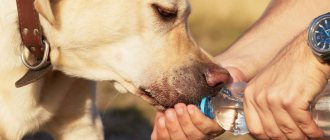In recent decades, digestive problems - constant constipation, flatulence after consuming modern refined food products, most of which in a market economy are produced not according to GOST standards, but according to technical specifications, often with a large number of food additives against the backdrop of decreased physical activity, have become a real disaster for people .
These modern “innovations” have not bypassed the food industry, intended for feeding our smaller brothers – dogs and cats.
One of the symptoms of this feeding and sedentary lifestyle in dogs is that when communicating with our friends, we often hear their stomach growling.
Sounds made by a dog's intestines can be completely normal and are associated with the processes of digestion and peristalsis during digestion.
A healthy animal is capable of producing and releasing into the environment at least one liter of gases formed in the intestines during the day. Moreover, as researchers have established, more than 90% of the gas emitted by a dog is methane, which has practically no odor to its owners. Foul-smelling discharge is the result of the presence in the gas of hydrogen sulfide and other “fragrant” substances formed as a result of the disrupted digestion process. If gases do not leave the intestines as a result of intussusception, this can even lead to intestinal rupture and death.
Often a similar phenomenon can be observed in those dogs that are in a hurry while eating and, along with food, swallow a large amount of air, which, moving in the intestines along with the food, makes gurgling and seething sounds.
Should dog owners need to worry?
In most cases, this seething in dogs does not pose any threat, since this phenomenon often occurs as a result of a sudden change in food when a new food is introduced into the diet. But still, sometimes loud sounds coming from the intestines are a reason for owners to be wary. This seething may be a sign of any serious diseases of the gastrointestinal tract, especially when the dog’s health worsens, fatigue, drowsiness, trembling, nausea and much more appear.
The most common cause of stomach turmoil in dogs is intestinal flatulence.
Content
1. Why are sounds coming from the abdominal cavity? 2. The dog’s stomach is rumbling - is this a pathology or not? 3. Causes of rumbling 4. Flatulence 5. Who is at risk 6. Treatment 7. When you need veterinary help 8. How to prevent
A dog's stomach growls - this is a common phenomenon. Sometimes the pet behaves calmly, and sometimes it whines in pain and loses its appetite. What happens in the stomach and intestines and how to help your four-legged friend - this knowledge will not interfere with a novice dog breeder.
Prevention
Prevention of physiological processes is very simple if they are not taken to an extreme degree when it is impossible to eliminate them. So, how to do prevention?
- Do not overfeed the animal beyond measure, and do not suddenly switch to other foods.
- Try to find your own guide to balancing your animal’s feed; if this doesn’t work, contact a specialist.
- Do not feed your pet food that is not suitable for its body, or rather, for digestion in the dog’s stomach.
Prevention of stomach and liver diseases:
- proper, balanced and nutritious nutrition for the animal;
- preventing poisons, chemicals, toxins and foreign objects from entering the dog’s body;
- animal vaccination.
The dog's stomach is rumbling - is this a pathology or not?
In a dog, as in a person, rumbling in the stomach can be normal if the stomach is empty or full, when digestive juice is intensively produced. The sounds of hunger even have a scientific name - borborygmus.
Intestinal peristalsis does not occur silently. The gastrointestinal tract can also react loudly to a sudden change in diet. When a dog quickly eats food, it takes in a lot of air, which moves through the gastrointestinal tract to the accompaniment. All this is normal if there is no diarrhea, vomiting, or fever.
In other cases, sounds from the gastrointestinal tract are caused by pathological conditions of the body (stress, anxiety) or diseases of the digestive system. The lion's share of rumbling comes from irritable bowels. Rumbling associated with the formation of gases is considered normal if the stomach growls periodically and not for long, and there is no pain. But if flatulence is observed - increased gas formation - then rumbling turns into a pathology.
Seething in the stomach rarely threatens the dog’s health; more often, it is a signal that problems have arisen in the gastrointestinal tract.
Discharge from nose and eyes
If diarrhea is accompanied by signs of a runny nose and conjunctivitis (discharge from the nose and eyes), as well as high fever, weakness and cough, then this most often indicates viral diseases:
- plague (parvovirus enteritis);
- adenovirus;
- coronavirus;
- rotavirus (“stomach flu”).
Such pathologies most often affect small puppies that have not yet undergone vaccination. In these cases, it is necessary to urgently contact a veterinarian. Many of the above diseases (especially distemper) are deadly for animals. The pet must be hospitalized immediately.
Causes of rumbling
The causes of stomach turmoil are divided into 2 groups. The first is errors in nutrition. They are quickly eliminated, and the four-legged patient’s condition returns to normal. One of the problems is overeating. In many breeds, the satiety center in the brain is atrophied, so the dog eats as long as he sees food in the bowl. The second problem is swallowing air. This happens when the dog is hungry, eats and drinks greedily, and does not chew large pieces.
Finally, the wrong food. Dogs eat food from the master's table with appetite: sausages, fruits, vegetables, sweets, after which their stomachs often rumble. Many foods are not completely digested and contain harmful additives. Grapes, apples, bananas, onions, legumes, and cabbage are contraindicated for dogs. They cause rotting and fermentation in the intestines, which then lead to flatulence and colic.
The second group of reasons are pathologies in the animal’s body:
- Parasitic diseases. Worms eat food masses and fill the intestines with their waste products. The stomach growls and gurgles, the stool becomes foamy. Intoxication of the body causes vomiting.
- Poisoning caused by spoiled food, garbage, poisonous plants and insects, and household chemicals.
- Intestinal infections. Pathogens: bacteria, viruses, protozoa.
- Intestinal dysbiosis. Disruption of the microflora leads to a decrease in beneficial bacteria, food is not completely digested, and flatulence develops.
- Pancreatitis. Due to the lack of enzymes secreted by the pancreas, food is not completely digested and is poorly absorbed into the intestines. The problem is more common in toy terriers, spaniels, Yorkies, and poodles.
- Food allergies. Chicken meat, milk, seafood, and eggs most often cause allergies.
Different diseases give the same symptoms, and only a veterinarian can determine the true cause.
Intestinal parasites
Parasites that live in a dog's gastrointestinal tract include worms (tapeworms, whipworms), Giardia, coccidia and cryptosporidium. Having settled in the dog’s intestines, they begin to actively multiply, feeding on incompletely digested food masses, thereby robbing the pet of useful and nutritious substances.
If the disease is not treated, then over time, less and less food mass will remain in the lumen of the dog’s intestines, which will lead to an abundant accumulation of gases. This is also facilitated by the fact that helminths are capable of “poisoning” the host with their toxins produced during their life. The more gas accumulates, the louder your stomach will grumble. However, getting rid of worms and harmful microorganisms is not as difficult as it might seem at first glance.
At the first symptoms, take the animal to the doctor, where, after examining its stool, the veterinarian will be able to accurately determine what type of parasite has settled in the pet’s body. This will make it easier to build a therapeutic regimen that prescribes the right type of deworming treatment for your dog. Additionally, the doctor may prescribe a course of supporting vitamins and probiotics for the dog. With their help, the pet will return to normal much faster.
Flatulence
This pathology needs to be discussed separately, because in dogs, increased gas production is a common phenomenon that can be fatal. Flatulence must be treated, otherwise problems may arise not only with digestion, but also with breathing and the cardiovascular system. It is not the gases that come out that are dangerous, but those that accumulate inside.
The acute form of the disease is the most dangerous. Severe vomiting and diarrhea appear, the oral mucosa becomes gray or bluish. The dog does not eat, lies motionless and whines. Urgent consultation with a veterinarian is needed.
Chronic and delayed forms often go unnoticed. The pet does not always lose appetite and eats in small portions. Sometimes there is gurgling in the stomach, and loose stools may occur after a walk.
Flatulence is caused by the following factors:
- unbalanced diet;
- spoiled food;
- predominance of plant proteins in the diet;
- helminthiasis;
- constipation;
- inflammatory diseases of the gastrointestinal tract;
- pathologies of internal organs;
- low mobility.
In addition to loud rumbling, symptoms of flatulence include cramping pain and belching. The abdomen swells and becomes hard. Frequent vomiting occurs, leading to dehydration, and stool disturbances. The dog is losing weight. There are traces of blood and mucus in the stool.
Preventive measures for Spitz diseases
Most often, the problem can be avoided if preventive measures are carried out in a timely manner and the animal is properly fed and cared for.
Preventive examination
To do this you need:
- maintain control over what the Spitz eats;
- feed according to the schedule, observing portion sizes;
- provide the required amount of minerals and vitamins;
- do not let the baby pick up anything from the floor;
- carry out deworming every season;
- Give medications only after consultation with a veterinarian and strictly follow the dosage.
Carefully observe your pet's behavior and appearance. Any changes may be a reason to visit the veterinary clinic.
Who's at risk
The following breeds are genetically predisposed to flatulence:
- Saint Bernard;
- boxer;
- Rottweiler;
- some types of shepherd dogs;
- English and French bulldogs;
- English Mastiff;
- soft coated terrier;
- beagle;
- basset hound;
- pug.
Sedentary and obese dogs are at risk. Short-nosed breeds swallow a lot of air while eating, which is why they experience frequent flatulence (fart a lot).
Diagnostics
Only a veterinarian can determine the exact cause of diarrhea. The pet must undergo the following diagnostic examinations:
- stool analysis for helminth eggs and bacteria;
- general clinical blood test;
- blood test for biochemical parameters;
- serological tests for viral infections.
If gastrointestinal diseases are suspected, an x-ray and ultrasound examination of the abdominal cavity are prescribed.
Treatment
The treatment strategy depends on the cause of the pathology. For flatulence, the dog is given sorbents (Enterosgel, Polysorb, activated carbon), the carminative drug Espumisan or Simethicone is given as an ambulance, and the stomach is washed out. For diarrhea, Loperamide and Smecta come first. Jogging helps. In severe cases, a needle is used to pierce the abdominal cavity to release gases. The cause of the pathology is determined and specific treatment is prescribed.
Much attention is paid to nutrition. The diet includes food that coats the walls of the stomach: flax seeds, oatmeal and rice porridge, oat jelly. Chamomile decoction is added to liquid food. Exclude milk, dry food, legumes, and fish from the diet.
To help your pet recover faster, increase the duration of walks.
For dysbacteriosis, probiotics and prebiotics are given: Lactoferon, Bifidum SHS, FortiFlora, Vetelakt, Viyo.
Worms are removed with anthelmintic drugs. Pyrantel, Prasitel, Fenbendazole, Prazicide, Milbemax are effective. It is not advisable to use folk remedies. What is suitable for humans may be contraindicated for dogs, for example, garlic.
In case of poisoning, the stomach is washed, enemas are given, diuretics and laxatives are given, and a diet is prescribed. Intestinal infections are treated with antibiotics, sometimes Metronidazole is used.
To relieve intestinal spasms, drugs with belladonna extract, Bellastesin tablets, and Becarbon are used. Almagel and Gastrofarm help with gastroenteritis.
In all cases, they provide gentle fractional nutrition, avoiding diversity in the diet.
Therapy with a specialist
When contacting, the veterinarian will examine the symptoms bothering the animal and determine the causes of the disease. In addition, he will analyze your diet.
Gastritis
If gastritis is diagnosed, a fasting diet is prescribed for 1 or 2 days. Water is not limited.
- gastric lavage. Use 1% sodium chloride solution, 0.05% lactic acid solution or potassium permanganate;
- taking 1 tablespoon of natural gastric juice or plantaglucide;
- antibiotics or sulfa drugs;
- taking vitamins, enzymes;
- dieting. Course - 1 month.
The same thing if the diagnosis is gastroenterocolitis, poisoning and ulcer.
Intestinal blockage
- surgical intervention to remove foreign bodies;
- oily and mucous agents are prescribed;
- warm enemas with soapy water and disinfectants.
Hepatosis
- a diet excluding fish, bones, dry food, spices, fats, oils, bread;
- Lipotropic, vitamin and choleretic drugs are prescribed.
Cirrhosis of the liver
- the diet consists of easily digestible feed with plenty of proteins and vitamins;
- drug treatment in later stages is not effective;
- prescribe hepatoprotectors that will alleviate the condition;
- Choleretic drugs are widely used.
When do you need veterinary help?
Often, rumbling in the intestines is a temporary phenomenon and does not cause problems, but is sometimes accompanied by symptoms that require immediate consultation with a veterinarian:
- blood, mucus, yellow, green, or foamy matter in the stool;
- temperature increase;
- refusal to eat;
- skin rashes;
- severe pain syndrome;
- vomit;
- diarrhea or constipation;
- unquenchable thirst.
Each of these symptoms indicates a dangerous and serious illness.
Where to contact
This problem is best dealt with by a specialist – a veterinary gastroenterologist.
Doctors of this specialty are available in all major veterinary clinics. When making an appointment, you need to ask whether the clinic has its own laboratory and ultrasound machine. In Moscow, these can be veterinary clinics: Bely Klyk, Biocontrol, Svoy Doktor, Zoovet, Medvet .
In St. Petersburg, you can contact the clinic named after A. Fillmore, the veterinary clinic of Dr. Sotnikov, Pride .
Quantity
Share this post
Tweet
You may also like…
- Dog cleaning











